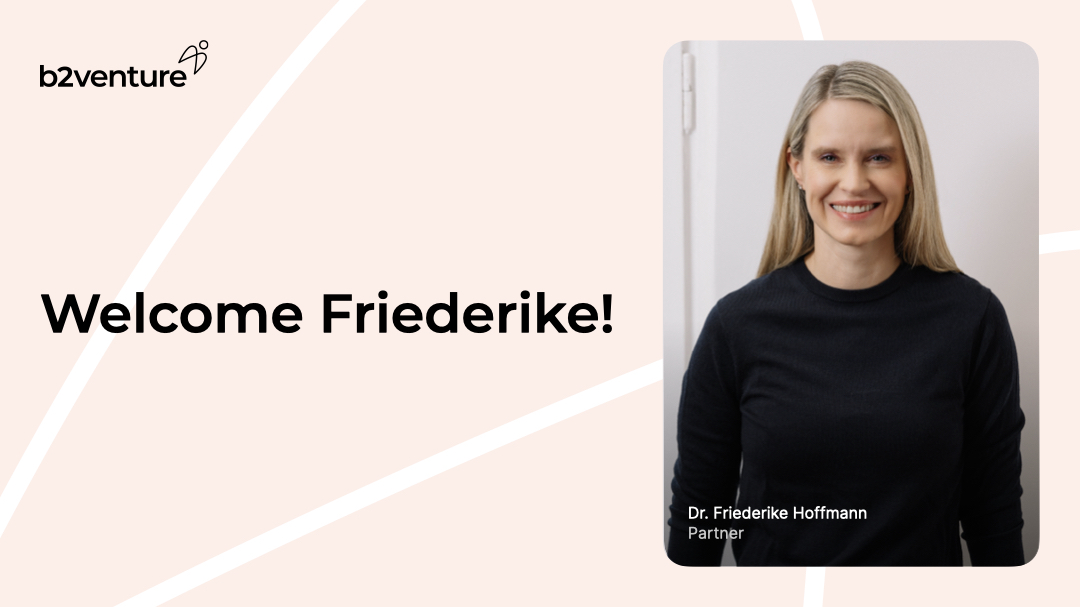Leading by example - How angel investors can maximize their impact with Joachim Schoss
Leading by example - How angel investors can maximize their impact with Joachim Schoss

Joachim Schoss doesn’t see himself as a startup investor.
“I don’t see myself as a startup investor. I discovered that my favorite role is co-founding and supporting startups as a business angel and as a chairman of the board, where I can also help shape what happens in an entrepreneurial way. I bring my network and expertise to the table, but I don't necessarily invest a lot of money,” says Joachim.
Over the course of his career, Joachim has been first and foremost an entrepreneur. In 1990 he founded and led TellSellConsulting, which was eventually sold to KPMG, in parallel starting TelCare, itself acquired by the American multinational outsourcing provider, Sykes International. In early 1998 he founded ImmobilienScout24, and later in 1998 the Scout24Gruppe, which he led as CEO and later as Chairman until it was acquired by Deutsche Telekom in 2003.
“The difference between an entrepreneur and an investor is that an entrepreneur has to be enthusiastic and believe that they and their team can make it. A good investor, on the other hand, should be a skeptic who is always asking why something shouldn't work.”
He says the best founding teams consist of people with extreme personalities - think of the visionary or the perfectionist or the technical wizard - and a team dynamic where everyone can manage to bring their extraordinary skills together and complement each other in a constructive way in order to build something larger than themselves.
Life as an angel investor and leading by example
“My experience as an angel investor has run the gamut from being very involved in the day-to-day, helping a team acquire their first customers and setting up operational structures to a very hands-off approach,” says Joachim.
“For example, when I met Daniel Klein for the first time in 2000 when he was founding his first company that later became Skrill and I did an angel investment, I was very busy and couldn't get that involved. I helped him with some issues such as financial regulations in the UK, but not much beyond that in the beginning. However, Daniel proved to be able to manage impressively well on his own at his young age.”
Joachim has been an angel investor to dozens of startups such as Skrill, who’s founder Daniel Klein went on to become a b2venture angel investor himself, before founding SumUp, which has been backed by the b2venture community from the very beginning. Joachim has served on the board of many of his investments, including ResearchGate and 1plusX, as well as established companies such as Holtzbrinck Verlag and Neue Zürcher Zeitung.
As these companies grow, their needs change, moving from informal to more formal structures for governance. Here Joachim believes in leading by example.
“Having solid ideals for the board and for the management team that hinge on value-add and professionalism are very important. At ResearchGate, I gave my board seat to one of the PayPal founders because I felt he added more value. But not everyone shares this notion, especially if it's a successful company.”
Joachim says being absolutely professional about the process from the very beginning is key and not that difficult to achieve if you have the right approach.
“You always want to be able to do essential things like due diligence early on and document everything carefully. What gets added over time are more elements such as bylaws, committees, management metrics, and the like. The board running a company pre-IPO should be capable of running the company after the IPO as well - this is also part of the company's ultimate valuation.”
Joachim warns that overlaying too many structures on a growing company such as board committees is not always necessary. “In my experience as a board member at publicly traded companies and at my own startups, we never set up a committee before the IPO. There were, for instance, no committees at Scout24 during my time.”
Getting a company board right
One thing he is adamant about are the qualities that a good chairperson brings to bear.
“In the business world, there are both dominant and facilitator-type leaders. A good chair combines both qualities. They should be able to bring out the best of all the perspectives at the table but also be willing to make decisions and consistently implement them.”
The chair is a member of the management team, even if they are a counterparty for compliance reasons, according to Joachim. “It’s very important that the board doesn’t position themselves as a controller, but as running the company together with the management and, above all, supporting the management team in every possible way.”
There are several paths to develop into this role, says Joachim. Experience, even in smaller and younger companies, is important. It’s also crucial to remember that there is a difference between a board member and the chairperson. A chairperson – especially in Switzerland - has a much larger responsibility and workload than a typical board member, who has no staff responsibilities and only has to vote four times a year, whereas the chairperson should have a very active role. One option is to develop the role of chair through the board membership. Joachim also believes it is important to keep in mind that the chairperson must always be ready to lead the company in an emergency, say, for example, if the CEO is incapacitated due to a medical emergency or unavailable for another reason.
“This requires not only skill and willpower, but also extensive managerial experience to lead the company through difficult times. If these competencies do not reside within the board and within the chair, then having a board for which management has to prepare a presentation every three months can become an unnecessary drain on resources.”

Dealing with challenges
Even in an ideal board set-up, challenges can arise. For example, a board member can simply not be meeting expectations and the requirements for the job. A good chair should be direct and have a conversation as early as possible, ask if the person wants to step down and explore if there is already a suitable replacement candidate.
If things are not amicable and take a turn toward confrontation, you can try and vote the person out. “If you can't get the votes, then you have a real problem on your hands.” This is a major reason why Joachim believes startups should always do due diligence on their investors, really know what they bring as partners to the table and understand the implications of giving them board seats.
Joachim also believes in helping younger angel investors grow into being productive board members and works with b2venture to help educate investors from across the b2venture angel community.
A good rule of thumb: the role of a business angel depends on the size of their stake in the company. If they hold only a small share, they should not hinder the workflow or disrupt the development with excessive requests or creative ideas. It is thus advisable to keep a low profile and be available only in a supportive capacity in such situations.
If they have greater involvement and are on the board, there are more opportunities to contribute. However, care should be taken to ensure that collaboration is fruitful and does not become counterproductive.
Joachim has best practices for his board activities that he shares regularly with the wider b2venture investor community, and we are grateful to be able to collaborate with him in both investing in new companies and ensuring good governance across our portfolio.
Joachim is also a passionate advocate for people with disabilities and has been the driving force behind the charitable foundation EnableMe, as well as working to limit climate change and driving sustainability forward by supporting organizations such as Earthguard.
Thank you Joachim for all you do for the b2venture community!

Joachim Schoss doesn’t see himself as a startup investor.
“I don’t see myself as a startup investor. I discovered that my favorite role is co-founding and supporting startups as a business angel and as a chairman of the board, where I can also help shape what happens in an entrepreneurial way. I bring my network and expertise to the table, but I don't necessarily invest a lot of money,” says Joachim.
Over the course of his career, Joachim has been first and foremost an entrepreneur. In 1990 he founded and led TellSellConsulting, which was eventually sold to KPMG, in parallel starting TelCare, itself acquired by the American multinational outsourcing provider, Sykes International. In early 1998 he founded ImmobilienScout24, and later in 1998 the Scout24Gruppe, which he led as CEO and later as Chairman until it was acquired by Deutsche Telekom in 2003.
“The difference between an entrepreneur and an investor is that an entrepreneur has to be enthusiastic and believe that they and their team can make it. A good investor, on the other hand, should be a skeptic who is always asking why something shouldn't work.”
He says the best founding teams consist of people with extreme personalities - think of the visionary or the perfectionist or the technical wizard - and a team dynamic where everyone can manage to bring their extraordinary skills together and complement each other in a constructive way in order to build something larger than themselves.
Life as an angel investor and leading by example
“My experience as an angel investor has run the gamut from being very involved in the day-to-day, helping a team acquire their first customers and setting up operational structures to a very hands-off approach,” says Joachim.
“For example, when I met Daniel Klein for the first time in 2000 when he was founding his first company that later became Skrill and I did an angel investment, I was very busy and couldn't get that involved. I helped him with some issues such as financial regulations in the UK, but not much beyond that in the beginning. However, Daniel proved to be able to manage impressively well on his own at his young age.”
Joachim has been an angel investor to dozens of startups such as Skrill, who’s founder Daniel Klein went on to become a b2venture angel investor himself, before founding SumUp, which has been backed by the b2venture community from the very beginning. Joachim has served on the board of many of his investments, including ResearchGate and 1plusX, as well as established companies such as Holtzbrinck Verlag and Neue Zürcher Zeitung.
As these companies grow, their needs change, moving from informal to more formal structures for governance. Here Joachim believes in leading by example.
“Having solid ideals for the board and for the management team that hinge on value-add and professionalism are very important. At ResearchGate, I gave my board seat to one of the PayPal founders because I felt he added more value. But not everyone shares this notion, especially if it's a successful company.”
Joachim says being absolutely professional about the process from the very beginning is key and not that difficult to achieve if you have the right approach.
“You always want to be able to do essential things like due diligence early on and document everything carefully. What gets added over time are more elements such as bylaws, committees, management metrics, and the like. The board running a company pre-IPO should be capable of running the company after the IPO as well - this is also part of the company's ultimate valuation.”
Joachim warns that overlaying too many structures on a growing company such as board committees is not always necessary. “In my experience as a board member at publicly traded companies and at my own startups, we never set up a committee before the IPO. There were, for instance, no committees at Scout24 during my time.”
Getting a company board right
One thing he is adamant about are the qualities that a good chairperson brings to bear.
“In the business world, there are both dominant and facilitator-type leaders. A good chair combines both qualities. They should be able to bring out the best of all the perspectives at the table but also be willing to make decisions and consistently implement them.”
The chair is a member of the management team, even if they are a counterparty for compliance reasons, according to Joachim. “It’s very important that the board doesn’t position themselves as a controller, but as running the company together with the management and, above all, supporting the management team in every possible way.”
There are several paths to develop into this role, says Joachim. Experience, even in smaller and younger companies, is important. It’s also crucial to remember that there is a difference between a board member and the chairperson. A chairperson – especially in Switzerland - has a much larger responsibility and workload than a typical board member, who has no staff responsibilities and only has to vote four times a year, whereas the chairperson should have a very active role. One option is to develop the role of chair through the board membership. Joachim also believes it is important to keep in mind that the chairperson must always be ready to lead the company in an emergency, say, for example, if the CEO is incapacitated due to a medical emergency or unavailable for another reason.
“This requires not only skill and willpower, but also extensive managerial experience to lead the company through difficult times. If these competencies do not reside within the board and within the chair, then having a board for which management has to prepare a presentation every three months can become an unnecessary drain on resources.”

Dealing with challenges
Even in an ideal board set-up, challenges can arise. For example, a board member can simply not be meeting expectations and the requirements for the job. A good chair should be direct and have a conversation as early as possible, ask if the person wants to step down and explore if there is already a suitable replacement candidate.
If things are not amicable and take a turn toward confrontation, you can try and vote the person out. “If you can't get the votes, then you have a real problem on your hands.” This is a major reason why Joachim believes startups should always do due diligence on their investors, really know what they bring as partners to the table and understand the implications of giving them board seats.
Joachim also believes in helping younger angel investors grow into being productive board members and works with b2venture to help educate investors from across the b2venture angel community.
A good rule of thumb: the role of a business angel depends on the size of their stake in the company. If they hold only a small share, they should not hinder the workflow or disrupt the development with excessive requests or creative ideas. It is thus advisable to keep a low profile and be available only in a supportive capacity in such situations.
If they have greater involvement and are on the board, there are more opportunities to contribute. However, care should be taken to ensure that collaboration is fruitful and does not become counterproductive.
Joachim has best practices for his board activities that he shares regularly with the wider b2venture investor community, and we are grateful to be able to collaborate with him in both investing in new companies and ensuring good governance across our portfolio.
Joachim is also a passionate advocate for people with disabilities and has been the driving force behind the charitable foundation EnableMe, as well as working to limit climate change and driving sustainability forward by supporting organizations such as Earthguard.
Thank you Joachim for all you do for the b2venture community!

The Author
Team








.jpg)












.png)




.jpg)
-min.png)


.jpg)













































.jpg)





















